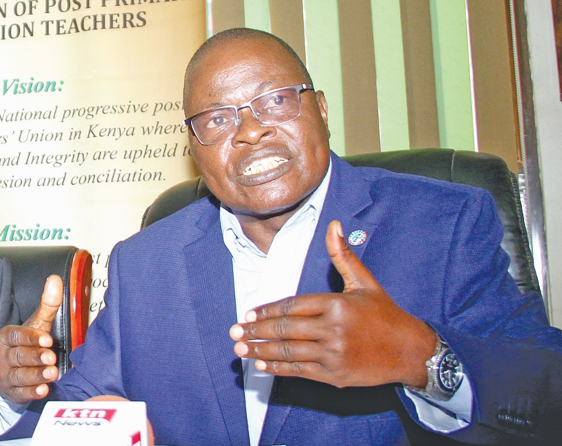By Sarah Muthama
Recently, I conducted a general opinion survey on parents’ views on CBC assessment. A parent with two children felt that the CBC assessment is worse than the 8-4-4 curriculum evaluation.
She complained that more often than not, she is called while at work to go back home with print outs of different materials.
She talked about an incident where she had to make a house from cartons, a guitar and a hat with the national flag and a seed bed, all in two weeks.
Evidently, parents are likely to resist this school involvement to maintain the status quo where they had relegated all their responsibilities to teachers in the old education system.
Another parent complained that the Competency-Based Assessment (CBA) guidelines are so prescriptive and teachers have to follow strait-jacket procedures that prohibit teacher’s creativity and learners’ skills development the curriculum advocates to uphold.
Some parents lamented that due to teacher scarcity in some schools, technical subjects such as Physical Health Education, Music, Creative Arts and Home Science are not taught yet learners are tested in the same.
A parent protested that the CBC requires massive resources whether at school or at home. Some projects need the use of digital gadgets and access to the internet, giving an extra cost burden to the already not well-to-do parents.
Already, most stakeholders opine that the CBC learning and assessment procedure is exacerbating existing inequalities in education. Some parents felt that some of the assessment projects given to their children are out-date and not in touch with the 21st Century digital world.
I still remember the quick “Math facts” and “mental sums” we had to cram and rehearse throughout our basic education schooling under the 8-4-4 curriculum so as to enhance our mastery of content.
Today’s generation is fortunate to live in a world of digital literacy full of great possibilities and limitless opportunities. One great advantage of the Competency-Based Curriculum (CBC) is its focus on outcomes of learning and the goals and processes of achieving them as opposed to the memorization of content.
The pros notwithstanding, the CBC implementation process has stirred heated conversations from varied stakeholders including parents. Many parents have expressed displeasure over how they are involved on the nature of assessments given to learners and the relevance and timeliness of the assessment projects and procedures.
But, how will curriculum implementers and educators know they are preparing their learners to fit in the 21st Century world? What is the role of the parents in this process?
Transformative education in which CBC is embedded requires a CBA that creates opportunities for learners to apply the skills and knowledge they have learnt to typical problems and situations in a real society.
The learner should be able to critically and creatively comprehend, apply, synthesize and utilize skills learnt in a purposeful way. The learner should inductively and deductively transfer the skills learnt to the world around him/her.
Learners are also given opportunities for self-assessment, where they are able to reflect on their strengths and abilities and create a profile for what they feel are strengths and what areas to develop. Parents are expected to support their children not only with resources but also by providing psychological support and motivation.
However, designing a CBA that aligns with an ever-changing world of work and academic standards is challenging. An effective CBA should involve a methodology to describe, model and assess learners’ competencies at all levels of skills and talents and within their (learners) contexts.
Competencies to be assessed need to focus on the student’s characteristics such as cognitive skills – unobservable traits hard-to-conceive and measure objectively, learner’s style, organizational abilities, teamwork and collaboration in a particular task, among other skills and values.
The CBA espouses three categories of assessments: prior learning assessments, formative assessments and summative assessments. Prior learning assessments check learners’ entry behaviour and previous exposure to what is being learnt. These experiences are incorporated into the student’s learning.
Formative assessment is interwoven with the learning process to create a continuous cycle for improvement where the learner’s assessment progress informs the new learning activity. Formative assessments are a critical part of CBA to inform students’ level of acquisition of competencies and whether the learner can utilize them independently and in authentic ways.
A summative assessment is conducted to assess the progress of the learner in meeting their learning goals. Unlike the 8-4-4 curriculum where learners are taught to believe in one answer/solution to a problem/question, CBC nurtures pluralistic thinking such that learners understand there is more than one solution to a problem.
From a monitoring and evaluation perspective, the developers, implementers of CBC and educators must embrace continuous monitoring of CBC implementation and assessment procedures and adjust them accordingly.
They should consider the voice and opinions of parents as they embrace the same skills the CBC advocate, such as communication and collaboration and teamwork, among parents. Parents need to be sensitized on their input and role in the CBC learning and assessment process.
Sarah Muthama – Teacher Educator & School Administrator (M.Ed-Educational Planning, M.A –Monitoring and Evaluation; B.Ed – English & Literature) Email: muthamasarah5@gmail.com






